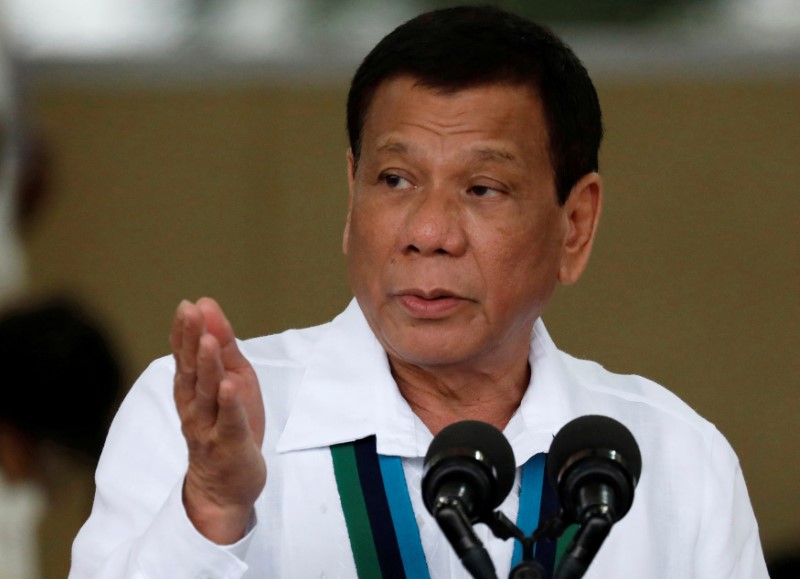
FILE PHOTO: Philippines President Rodrigo Duterte gestures during Change of Command ceremonies of the Armed Forces of the Philippines (AFP) at Camp Aguinaldo in Quezon City, metro Manila, Philippines October 26, 2017. REUTERS/Dondi Tawatao
March 14, 2018
By Neil Jerome Morales and Martin Petty
MANILA (Reuters) – Philippine President Rodrigo Duterte will withdraw from the International Criminal Court’s (ICC) Rome Statute, officials said on Wednesday, due to what he said were attacks by U.N. officials and violations of due process by the ICC.
The ICC on Feb. 8 started a preliminary examination of a complaint filed by a Philippine lawyer accusing Duterte and top officials of crimes against humanity committed during a war on drugs that has killed thousands of people.
Presidential spokesman Harry Roque confirmed in a text message to reporters that the Philippines was withdrawing, as stated in a 15-page statement dated March 13 seen by reporters, which said the withdrawal was “effective immediately”.
The statement had not been signed by Duterte, but presidential legal counsel Salvador Panelo confirmed it was authentic.
It said the withdrawal from the Rome Statue was due to the “baseless, unprecedented and outrageous attacks on my person as well as against my administration” by U.N. officials, and what he said was an attempt by the ICC prosecutor to seek jurisdiction over him “in violation of due process and presumption of innocence”.
ICC prosecutors could not immediately be reached for comment.
The bloodshed during the war on drugs, Duterte’s signature policy, has caused international alarm and fierce criticism from several U.N. rapporteurs and human rights officials.
But the maverick former mayor has hit back strongly and refused to change his approach, or accept that police may have executed suspected dealers, as activists allege.
Police say they have killed about 4,100 drug dealers in shootouts during official operations. They say they have no ties to unidentified armed men who have killed as many as 2,300 drug users and peddlers.
Duterte had initially dared the ICC to indict him, saying he was willing to rot in jail to save Filipinos from drugs, which he says are destroying his country. He even said he would prefer a firing squad than life in jail.
He has, however, changed his tune in recent weeks, telling security forces not to cooperate should there be any international investigation.
Last week, he said the ICC would “not in a million years” have jurisdiction to indict him.
The ICC’s preliminary examination into the complaint seeks to establish whether crimes have taken place. Such a process typically takes years.
The Philippine government insists the ICC has no business looking at the war on drugs, because its courts and legal processes are functional and independent.
The ICC can only intervene in a member state when that state is unable or unwilling to carry out investigations and prosecute suspected perpetrators.
According to international law, Duterte and the Philippines are under the jurisdiction of the ICC as a result of being a member of the court, and withdrawing would not change that jurisdiction retroactively.
(Additional reporting by Karen Lema in MANILA and Toby Sterling in AMSTERDAM; Editing by Michael Perry, Robert Birsel)

